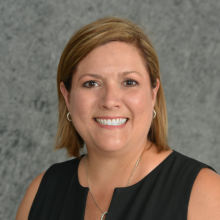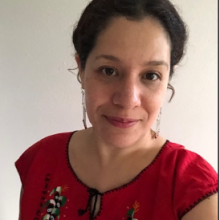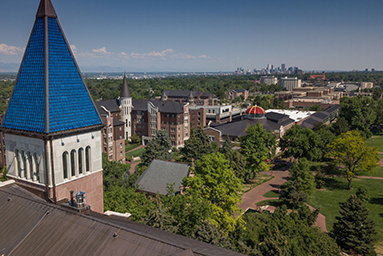Latinx Specialty Collaborates Across Campus
In the U.S. 17.4% of the population identify as Latino or Hispanic and of that population, 15% had a diagnosable mental illness in the past year. However, according to the American Psychological Association, only 5.5 percent of psychologists who identify as Latinx or another race/ethnicity report that they are able to use Spanish to provide clinical services. The University of Denver offers diverse training opportunities for students at the Graduate and Undergraduate level to prepare the workforce to provide best practice mental health services to address this gap and need. This past month, the Latinx Psychology specialty at GSPP teamed up with partners at the Graduate School of Social Work (GSSW), and Morgridge College of Education (MCE) to present at the National Latinx Psychological Association (NLPA) virtual conference.
Lorena Gaibor, LMSW, Hetty Pazos, PsyD, and Julia Roncoroni, PhD, presented on the Latinx University Collaborative: A Road Map to Train Graduate Students in Psychology and Social Work Programs. This presentation focused on best practice Latinx and bilingual and culturally responsive training that is provided at University of Denver through their programs. Together they represent a combination of expertise in Clinical Psychology, Social Work and Health Determinant Research and Practice. Best practice Latinx training offered through their programs includes course work, applied research and community participatory practices, clinical and field placement training, and cultural immersion experiences. Please read their bios below to learn more about their work at the University of Denver. Their goal is to continue collaborating across their programs with a focus to offer cross-disciplinary experiences for their students.
The NLPA is an organization dedicated to creating a supportive professional community that advances psychological education and training, science, practice, and organizational change to enhance the health, mental health, and well-being of Hispanic/Latinx populations.
Henrietta “Hetty” Pazos, PsyD
Dr. Hetty Pazos
Director, Latinx Psychology Specialty, Graduate School of Professional Psychology
University of Denver
Dr. Pazos is bi-cultural and bi-lingual in English and Spanish. She is Cuban-American and daughter of refugee parents who migrated to the United States and Venezuela between 1971 and 1981. In addition to her work in private practice, she is a professor at the University of Denver, Graduate School of Professional Psychology (GSPP) and is the Director of their Latinx Psychology Specialty. She lives with her partner of 20 years, Jay Knight and her two children, Gabriel y Samuel Pazos-Knight.
Dr. Pazos received her Doctorate at the University of Denver and completed her internship and post-doc at Jackson Memorial Medical Center in Miami, Florida, with a focus on Behavioral Medicine and Child and Adolescent psychology. She later obtained a certificate in School Psychology and worked in Denver Public Schools for 14 years providing administration over bilingual mental health assessment and intervention services to children and families. She work in private practice and specializes in Latinx assessment and intervention and neurobehavioral disorders.
Julia Roncoroni, Ph.D.
Assistant Professor, Department of Counseling Psychology
University of Denver
Dr. Julia Roncoroni is originally from Buenos Aires, Argentina. She has lived in the United States since 2007. Dr. Roncoroni received her doctoral degree in counseling psychology from the University of Florida in 2016. Her pre-doctoral internship was at Harvard Medical School. She has been faculty in the Counseling Psychology Department, at the University of Denver (DU), since 2016.
In the Morgridge College of Education (DU), she leads the Health Disparities Research Lab, where she conducts community-engaged and patient-centered research that aims to promote health and culturally sensitive health care, particularly in low-income racial/ethnic minority communities. The lab uses an academic-community partnership research approach and a community-based participatory research model. Dr. Roncoroni is passionate about teaching and believes that the classroom can be a uniquely transformative space where students learn to connect theory and practice through experiential learning.
Lorena Gaibor, MSW
Clinical Assistant Professor at the Graduate School of Social Work
University of Denver
Lorena Gaibor is on the faculty of the University of Denver’s Graduate School of Social Work where she also coordinates the Latinx Social Work Certificate Program. Prior to teaching her field experience included directing community programs, neighborhood redevelopment, and advocacy on affordable housing and immigration reform.
As a transplant from the east coast, it took Lorena time to adjust to life in CO as a Latina. Race relations are very different in CO from what they are in NJ/NY where Lorena was born and raised. The racial segregation and racialization, that Lorena experienced in CO, has led her on a path of decolonizing and Anti-Racism work which relates to the presentation that she will make as part of this mental health series. When Lorena is not working on immigration, anti-racism, and Latinx social work, she can be found meditating or hanging out with her grounding BIPOC community of friends to balance the heaviness of the focus on systemic oppression work that she engages in both academically and in her community.





